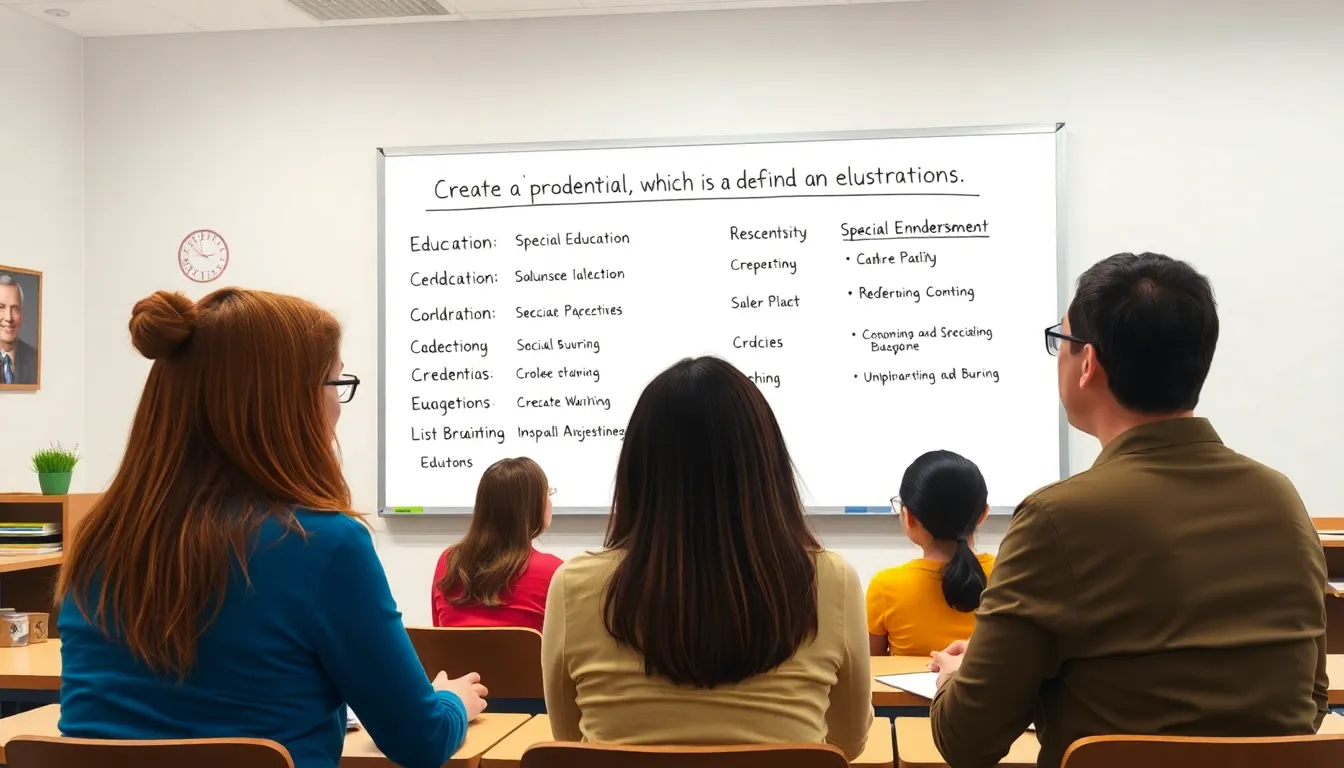Navigating the world of education can feel like trying to solve a Rubik’s Cube blindfolded, especially when it comes to special education. Those who venture into this rewarding field know that a special education credential isn’t just a piece of paper; it’s a golden ticket to making a real difference in students’ lives. With the right credentials, educators unlock the tools and strategies needed to support diverse learners, turning challenges into triumphs.
Special Education Credential
A special education credential denotes a qualification enabling educators to effectively teach students with diverse learning needs. This credential indicates an educator’s commitment to professional development and mastery of specialized teaching strategies.
Definition of Special Education Credential
A special education credential is a state-issued certification allowing teachers to work with students with disabilities. This credential covers various disabilities including learning disabilities, speech impairments, and emotional disturbances. Through this credential, educators gain knowledge about state standards, individualized education programs, and behavior management techniques. Qualifying for this credential typically involves completing a teacher preparation program and passing state assessments.
Importance of Special Education Credential
Gaining a special education credential holds significant importance for educators. This credential ensures they possess the expertise to adapt lessons and create inclusive environments. Training aids in understanding students’ unique needs leading to improved educational outcomes. Educators certified in special education contribute to a supportive school culture. The credential reflects dedication to providing comprehensive educational support for all students, enhancing both individual and group learning experiences.
Types of Special Education Credentials

Different states provide various credentialing options for special education educators. Each state establishes its own requirements, ensuring teachers meet specific standards for working with students with disabilities. For instance, California offers the Education Specialist Instruction Credential, while Texas provides the Special Education EC-12 Certificate. Educators should assess their state’s guidelines to choose the right path for certification.
Credentialing Options by State
State agencies govern credentialing options. Variations exist depending on regional regulations. In some states, a bachelor’s degree in education is essential, while others may allow alternative routes, including temporary permits. Practicing teachers often pursue additional credentials to expand their expertise in specific areas of special education. Making informed choices about these options ensures educators align their skills with state requirements.
Endorsements and Specializations
Endorsements and specializations enhance educators’ credentials. These additional qualifications focus on specific areas within special education, such as behavior analysis or autism spectrum disorders. An educator pursuing an endorsement develops targeted skills, increasing their effectiveness in addressing diverse student needs. Various institutions offer these programs, often requiring coursework and field experience. Selecting the right specialization leads to improved student support and learning outcomes.
Requirements for Obtaining a Special Education Credential
Special education credentials require specific educational prerequisites and assessment standards. Understanding these requirements supports educators in their professional journey.
Educational Prerequisites
Obtaining a special education credential usually starts with earning a bachelor’s degree in education or a closely related field. Many states also mandate completion of specific coursework targeting special education strategies and practices. Graduate degrees, such as a master’s in special education, often enhance eligibility and provide deeper insights into effective teaching methods. Some programs integrate supervised fieldwork, which equips educators with real-world experience in diverse classrooms. Advanced coursework in areas like behavior management or inclusive education helps develop critical skills necessary for addressing varied student needs.
Examination and Assessment Standards
Examination requirements vary by state but typically include one or more standardized tests. These assessments evaluate knowledge in special education laws, teaching strategies, and understanding of disabilities. Many states also recognize the importance of performance assessments, where candidates demonstrate their teaching effectiveness in practice. Passing these examinations confirms a candidate’s readiness to provide specialized education. Continuous professional development and periodic recertification often keep educators updated on best practices in special education.
Benefits of Holding a Special Education Credential
Holding a special education credential opens doors for educators and profoundly influences students’ growth. This certification brings numerous advantages.
Career Opportunities
Many career paths open for those with a special education credential. Educational institutions actively seek teachers with specialized training to address diverse learning needs. Positions range from classroom teachers to special education coordinators and consultants. With evolving educational expectations, roles such as behavior specialists and inclusive educators become more significant. Salary potential also increases, as districts value the advanced skills these educators bring to their teams.
Impact on Students with Disabilities
Enhancing educational experiences for students with disabilities stands as a key benefit of special education credentials. Educators equipped with this certification develop tailored strategies that accommodate individual learning styles. They foster inclusive environments, promoting social integration and improving self-esteem among students. Building strong relationships with students leads to better academic performance and emotional well-being. Teachers trained in special education empower learners to achieve their full potential, ensuring that every student has a chance to succeed in their educational journey.
Conclusion
The journey to obtaining a special education credential is a vital step for educators dedicated to making a difference in the lives of students with diverse learning needs. This certification not only enhances their teaching abilities but also fosters an inclusive environment where every student can thrive. By pursuing additional endorsements and specializations, educators can further refine their skills and adapt to the evolving landscape of special education.
Ultimately, holding a special education credential signifies a commitment to professional growth and a passion for empowering students. As educators navigate the complexities of special education, their expertise will continue to shape the future of inclusive education, ensuring all students have the opportunity to reach their full potential.





